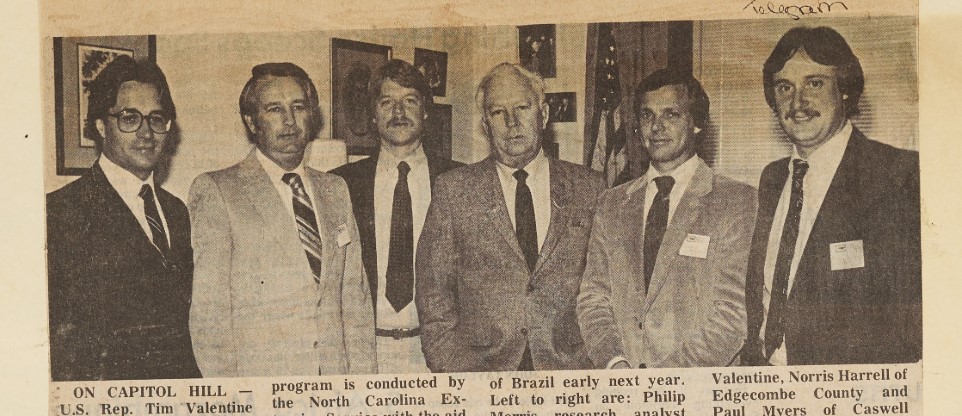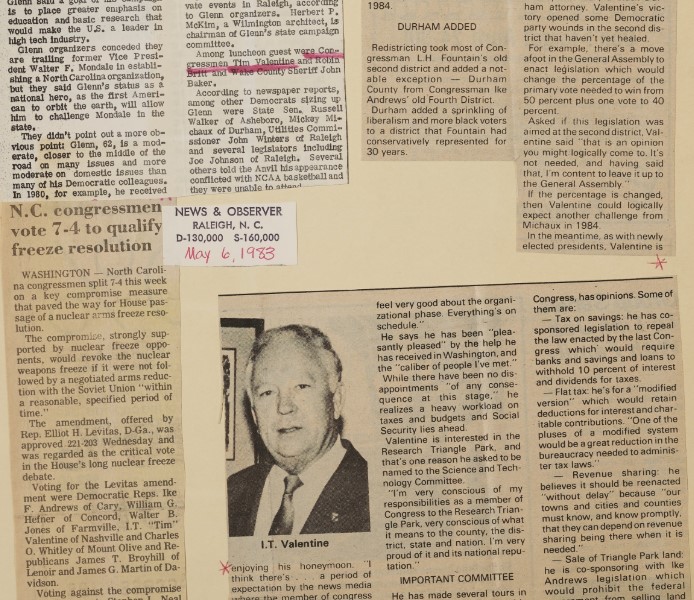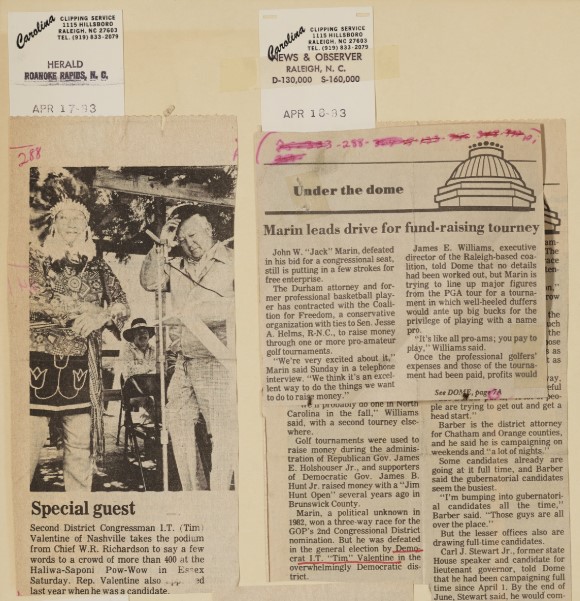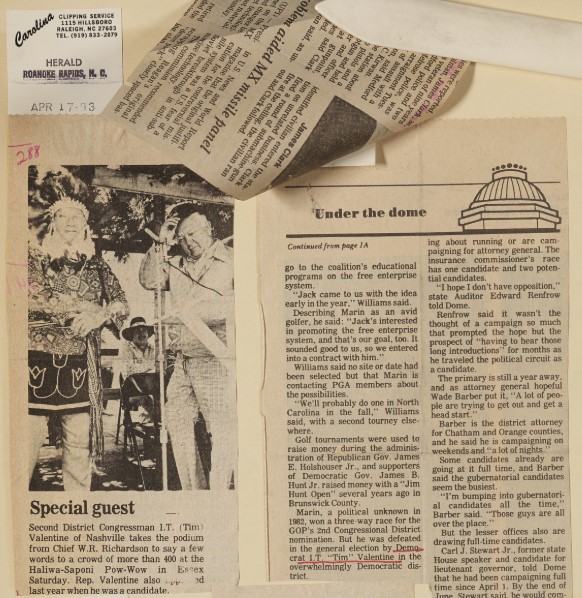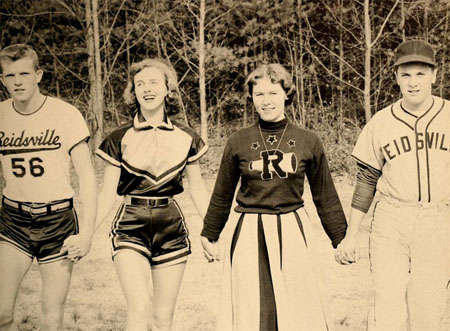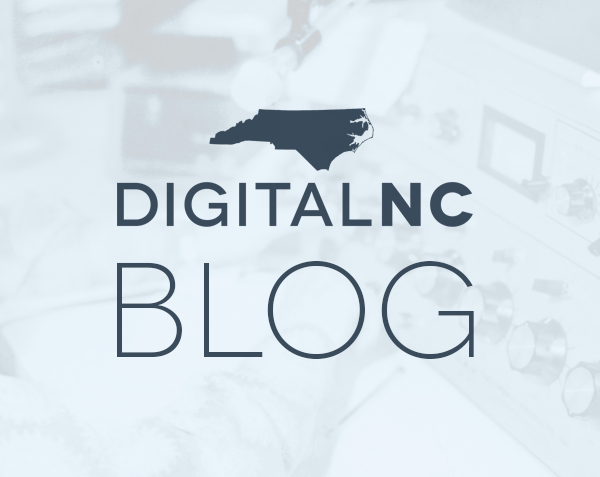Viewing search results for "Central Carolina Community College"
View All Posts
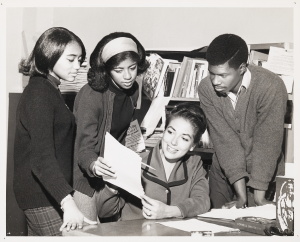
Ex Umbra Editorial Conference [1965]
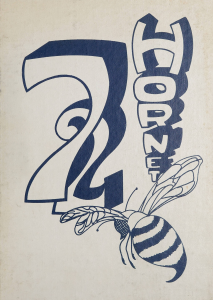 Along with materials about the university are materials from some of the historic Black high schools in Durham, especially Hillside High School. This batch has seven issues of the Hillside High School yearbook The Hornet (plus one yearbook from John R. Hawkins High School and two from the Lincoln Hospital School of Nursing). It also has several reunion programs and speeches, alumni directories, building and land records, a copy of the Hillside History Book, and two issues of the student newspaper The Hillside Chronicle. Though our partner did not have many issues of the Hillside High School student newspaper on file, we hope members of the community will be willing to contribute any issues they have saved to help make our digital collection more complete.
Along with materials about the university are materials from some of the historic Black high schools in Durham, especially Hillside High School. This batch has seven issues of the Hillside High School yearbook The Hornet (plus one yearbook from John R. Hawkins High School and two from the Lincoln Hospital School of Nursing). It also has several reunion programs and speeches, alumni directories, building and land records, a copy of the Hillside History Book, and two issues of the student newspaper The Hillside Chronicle. Though our partner did not have many issues of the Hillside High School student newspaper on file, we hope members of the community will be willing to contribute any issues they have saved to help make our digital collection more complete.
One especially exciting record from NCCU is the collection of boycott and student protest materials, which includes leaflets and a letter from a 1961 business boycott by the NAACP Youth Councils and College Chapters and correspondence from the 1970 SGA boycott. The 1961 boycott letter lists several recognizable stores that the NAACP YCCC successfully boycotted, and it makes an interesting mention of the role of race as an admission factor at Durham Academy. Separately, the demands of the SGA boycott (1970) are spelled out more clearly in this collection of correspondence between then-SGA President Phillip Henry and then-University President Albert Whiting. In the first document, students announce their intention to boycott classes until their “grievances and demands have been met to the satisfaction of the student body.” The organizers recommend the formation of a committee of students and faculty—where each have equal voting power—to implement solutions. For students looking for models of collective action and bargaining, these papers would be a good place to start.
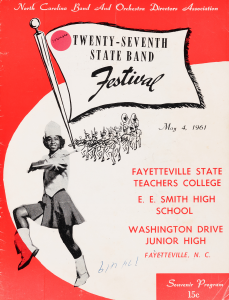 In terms of high school materials, one unique item from this batch is the Twenty-Seventh State Band Festival Program from 1961. The festival welcomed bands to Fayetteville State Teachers College and recognized some of the band directors from around the state. Former and current band kids may appreciate the list of pieces approved for the 1962 festival as well as the (somewhat familiar) rating system below.
In terms of high school materials, one unique item from this batch is the Twenty-Seventh State Band Festival Program from 1961. The festival welcomed bands to Fayetteville State Teachers College and recognized some of the band directors from around the state. Former and current band kids may appreciate the list of pieces approved for the 1962 festival as well as the (somewhat familiar) rating system below.
You can see the full batch of photos, programs, and other documents here, and the full batch of yearbooks and literary magazines can be found here. You can also see all issues of the North Carolina Central University student newspaper here and all issues of the Hillside High School student newspaper here. To see all materials from NCCU, you can visit their partner page and their website.
Thanks to our partner Randolph Community College, we’ve uploaded audio tapes of 62 interviews and discussions that informed the work Cultural Leadership Inside America’s Community Colleges by George Baker and contributors. Each interview asks an outstanding community college president or leader a series of questions about their leadership style and their vision for the future of their institution.
The large collection of tapes from interviewees around the country offers a great opportunity for teaching with primary sources; here are three ideas for how these materials could be used.
1. Journalism: What makes a good interviewer?
Although the interviewers in these tapes are rarely identified by name, their interviewing styles vary. Having a team of researchers ask the same set of questions makes it easier to identify some of the strategies that each person uses to engage their subject. Here are a few examples:
2. Representation & Gender
According to the American Association for Women in Community Colleges, close to 30% of community college presidents in 2020 were women. At the time of the recorded study, the researchers note that the proportion of women was closer to 7% (according to Baker and Rouche on tape 2). The majority of these tapes features interviews with male-identifying subjects; only four of the 50 community college presidents recognized for their leadership were women (thought other women in leadership positions at Miami-Dade CC were interviewed as well).
How do women’s answers differ from men’s in these recordings (or do they)? How do they approach the topic of representation in this setting?
3. History of Higher Education
In each of these recordings, community college leaders reveal some of the strategies that they use to attract and retain students, serve their populations well, and prepare their institutions for the future. Since this study’s findings were published in 1992, community colleges have had to adapt and reflect even more. What has changed in community college leadership over the past 30 years? How have schools shifted their approaches to serving students?
For comparison, it might be useful to check out our collections of N.C. community college handbooks and catalogs, which you can filter by school name and year.
You can see the full batch of audio recordings here. To see more materials from Randolph Community College, you can visit their partner page or their website. Even more audio materials are available in our North Carolina Sights and Sounds collection.
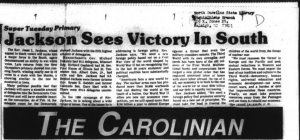
Coverage of the Jesse L. Jackson Presidential Campaign in 1988.
DigitalNC now has new issues of The Carolinian from 1988 to 1992. The Raleigh, NC based newspaper was a popular source of information for the African American Community in the RDU area. Each Monday and Thursday, The Carolinian informed the African American community of issues and news that affected their daily lives.
The new issues include the 1988 Presidential campaign coverage of Rev. Jesse L. Jackson, along with covering local stories from the Historical Black Colleges (HBCU) in the area, Shaw University and North Carolina Central.
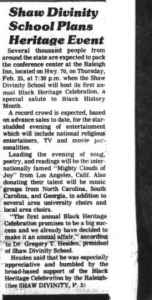
Coverage of the Shaw University Divinity School Heritage Event in 1988.
Still in print today, The Carolinian provides the African American community with news that takes place on the national, regional, and local levels. To see what The Carolinian looks like today, please visit their website. To view other African American community newspapers in North Carolina, visit our website here and click on African American Papers.
Special thanks to our partner the Olivia Raney Local History Library for their assistance. Visit their homepage by clicking here.
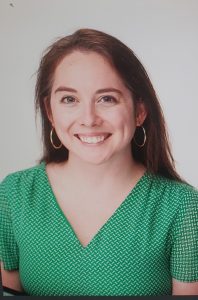
Erin Allsop, Archivist, Central Piedmont Community College
This year marks the North Carolina Digital Heritage Center’s 10th anniversary, and to celebrate we’ll be posting 10 stories from 10 stakeholders about how NCDHC has impacted their organizations.
Today’s 10 for 10 Q&A is from Erin Allsop, Archivist at Central Piedmont Community College. Since 2014, we’ve partnered with CPCC’s Library (Library home page | NCDHC contributor page) digitizing yearbooks, catalogs, scrapbooks and photographs. Erin has also been involved with the North Carolina Community College Archives Association since its beginning in 2018. Read below for more about our partnership with CPCC
What impact has NCDHC had on your institution and/or on a particular audience that means a lot to you?
I am the archivist for Central Piedmont Community College, and cofounder of the NC Community College Archives Association. Community College history, and their archival collections, are often over-looked or discarded. Thanks to the NCDHC and their assistance, most of the Community College materials are being made accessible for future generations over time.
Central Piedmont Archives collections could not be made publicly available without the support of the Digital Heritage Center and their staff. While they provide a literal platform (database) to share our institutional heritage materials with the world, they also provide a figurative platform to advocate for greater support of community college history, and efforts of community college archivists, throughout North Carolina. NCDHC has provided a wealth of knowledge and support for these initiatives, without judgement. This means more to me than I can describe.
What item or group of items on DigitalNC.org do you think everyone should know about?
The Central Piedmont History Scrapbooks and Dental Hygiene yearbooks!!
If you were asked to “describe what makes NCDHC great” in a few words, what would they be?
The NCDHC is tantamount to the success of most (if not all) smaller institutional archives throughout our state. While their resources are a wonderful tool for us to use, contribute to, and share with a wider audience, the kindness and consideration of the staff I have interacted with makes working with NCDHC even more enjoyable. They are a team of dedicated information professionals, who genuinely want to make a difference in the world by providing the platform to those without a voice. Thank you, a million times over. I cannot wait to see what the next 10 years has in store!
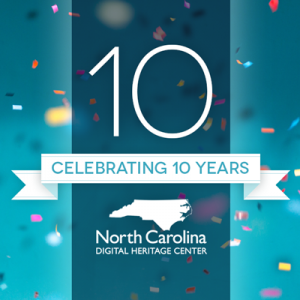
DigitalNC is happy to announce the addition of nine scrapbooks about U.S. Congressman Itimous “Tim” Thaddeus Valentine to our online scrapbook collection. These items were made available to digitize by our partners at Nash Community College and we are grateful to them for their contribution.
Tim Valentine represented the 2nd district of North Carolina, an east central district that formerly included Durham and Raleigh, in the U.S. Senate from 1983-1994. These scrupulously maintained scrapbooks span the first two years of his position, beginning from January 8, 1983 until September 20, 1984. His congressional appointment was marked by a highly publicized electoral race with civil rights activist and attorney Henry McKinley “Mickey” Michaux. Michaux would have become North Carolina’s first black congressman of the twentieth century if Valentine hadn’t narrowly defeated him in a contested runoff, causing much of Valentine’s freshman year to be devoted toward gaining ground with black voters.
Labeled a Democratic conservative during the 80’s, Valentine’s voting favored moderation, as when voting against the nuclear freeze (which he later supported) but voting for a $5 billion jobs package. Most of the images in these nine scrapbooks are newspaper clippings relating to Valentine, his political rivals, or his politics. These scrapbooks also feature ephemera, such as a certificate awarded to Valentine to highlight his support of Adult Continuing Education Week and a holiday card from President Reagan and Mrs. Reagan.
A note to readers: these scrapbooks contain many clippings stacked on top of another- therefore if it looks like there are duplicates of pages, there are! The duplicated pages should have the covered clippings exposed (you may notice a bone folder in some of the images) for full ability to read the contents.
For a look at all the scrapbooks mentioned, click here. To view all material from Nash Community College, click here. To get more information on Nash Community College, please visit their homepage here.
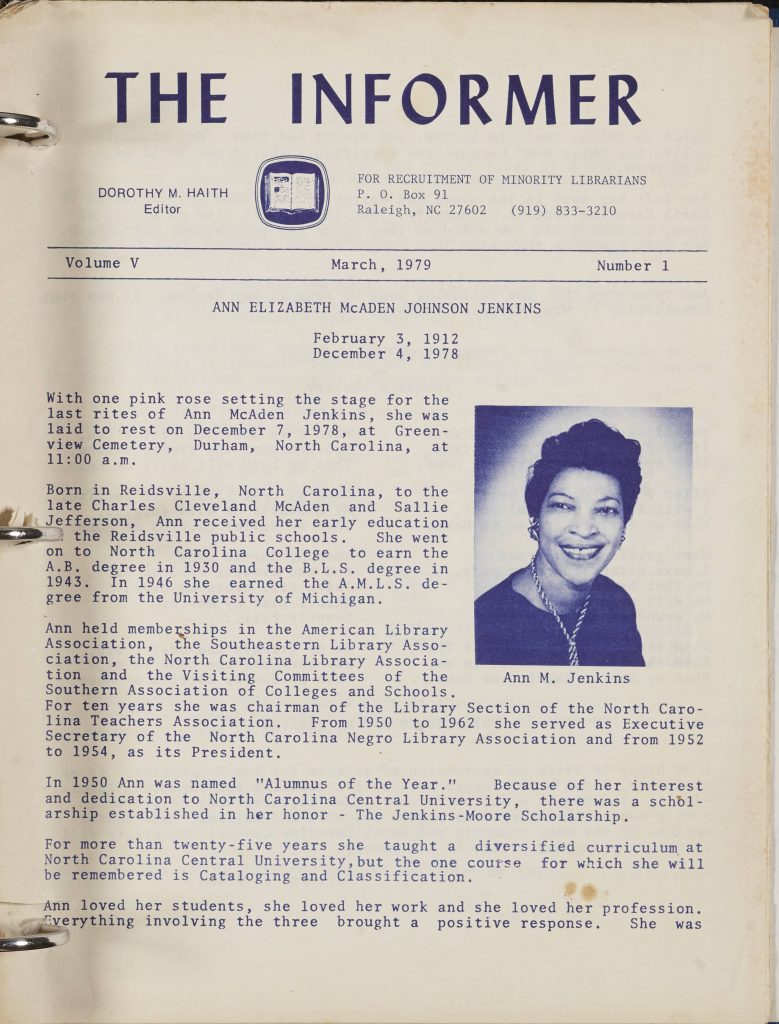
First page of the March 1979 issue of The Informer newsletter.
The Digital Heritage Center has worked with over 150 libraries throughout North Carolina. It’s no surprise that DigitalNC.org boasts a good number of items that document the history of libraries in the state, including scrapbooks and photos.*
For many years libraries were purposefully segregated, with branches tacitly or overtly meant to serve an African American neighborhood or community. The Richard B. Harrison Library in Raleigh is an example of a library that was a true social force, due to the hard work and influence of librarian Mollie Huston Lee. I thought of Ms. Lee recently. I was doing some work in our scrapbook collection, when I came upon an interesting newsletter tucked into one of the Irwin Holmes scrapbooks from the Durham County Library.
Titled “The Informer,” the newsletter’s tagline is: “For Recruitment of Minority Librarians” and appears to have been published first out of Raleigh and then out of Fort Valley, Georgia. There are two (possibly two and a half) issues in the scrapbook: one dating from March 1979 (pictured at right) and the second from September 1983. The issues of The Informer in our collection give biographies and moving tributes to African American librarians, such as Ann M. Jenkins of NCCU and Edna “Pinky” Penolya Mcaden King Watkins, an NCCU graduate who worked in libraries around the country. They also list positions available in North Carolina and around the country. The Informer publisher, IESMP or “Information Exchange System for Minority Personnel,” sold a number of other publications that offered to help librarians find jobs at institutions friendly to hiring minorities.
Dr. Dorothy May Haith was The Informer’s editor and possibly publisher, and she has had a lifelong passion for improving the profession and her community. A Shaw University and North Carolina Central University alum (she also holds degrees from Indiana University), Haith led the library at Bennett College, and also at Howard University. She has a number of publications to her name, has served on professional boards, and has given back to educational institutions by endowing scholarships. The Spring 2011 issue of Windows, published by the University Library at UNC Chapel Hill, describes a gift made to Wilson Library by Haith to honor those she felt encouraged her education (we call Wilson Library our home).
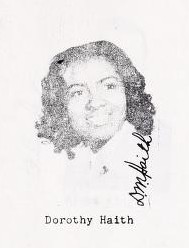
Dorothy Haith’s high school yearbook photo from Booker T. Washington High in Reidsville, N.C.
Through The Informer, Haith was building a network for minority librarians through the 1970s and 1980s, offering them professional resources and personal information about their peers. Though Googling gives most of us this benefit now (as it did for me when trying to find out more about Haith), before the internet, this was a true labor and a valuable service.
Recruitment of minorities and increasing diversity continues to be a great need. What many patrons may not realize is that libraries strive to be some of the most inclusive, safe spaces in the country. Many build towards that goal in numerous ways: through concerted efforts to recruit a diverse workforce, through selection of an inclusive and various group of materials for collections, and through ensuring libraries are safe for ALL patrons. In fact, the American Library Association, the national professional organization for librarians, reinforces these goals through a code of ethics, professional development, and scholarships. As a profession, we have a long way to go, but these steps get us closer.
At DigitalNC, we hope to identify and help share more collections from our partners related to North Carolina’s minority populations in the coming year. If you work at a library or other cultural heritage institution and have collections that fit this category that you’d like to share online, we’re eager to hear from you.
*There’s also a rich Library History digital collection from the State Library of North Carolina.
**NCCU has numerous issues of The Informer in their collection, available at the School of Library and Information Sciences Library.
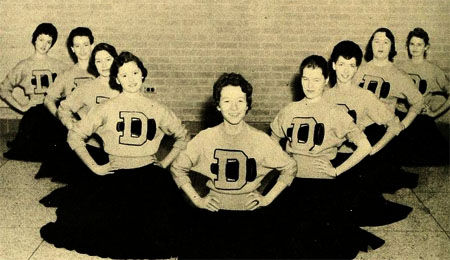
 Along with materials about the university are materials from some of the historic Black high schools in Durham, especially Hillside High School. This batch has seven issues of the Hillside High School yearbook The Hornet (plus one yearbook from John R. Hawkins High School and two from the Lincoln Hospital School of Nursing). It also has several reunion programs and speeches, alumni directories, building and land records, a copy of the Hillside History Book, and two issues of the student newspaper The Hillside Chronicle. Though our partner did not have many issues of the Hillside High School student newspaper on file, we hope members of the community will be willing to contribute any issues they have saved to help make our digital collection more complete.
Along with materials about the university are materials from some of the historic Black high schools in Durham, especially Hillside High School. This batch has seven issues of the Hillside High School yearbook The Hornet (plus one yearbook from John R. Hawkins High School and two from the Lincoln Hospital School of Nursing). It also has several reunion programs and speeches, alumni directories, building and land records, a copy of the Hillside History Book, and two issues of the student newspaper The Hillside Chronicle. Though our partner did not have many issues of the Hillside High School student newspaper on file, we hope members of the community will be willing to contribute any issues they have saved to help make our digital collection more complete. In terms of high school materials, one unique item from this batch is the Twenty-Seventh State Band Festival Program from 1961. The festival welcomed bands to Fayetteville State Teachers College and recognized some of the band directors from around the state. Former and current band kids may appreciate the list of pieces approved for the 1962 festival as well as the (somewhat familiar) rating system below.
In terms of high school materials, one unique item from this batch is the Twenty-Seventh State Band Festival Program from 1961. The festival welcomed bands to Fayetteville State Teachers College and recognized some of the band directors from around the state. Former and current band kids may appreciate the list of pieces approved for the 1962 festival as well as the (somewhat familiar) rating system below. 




